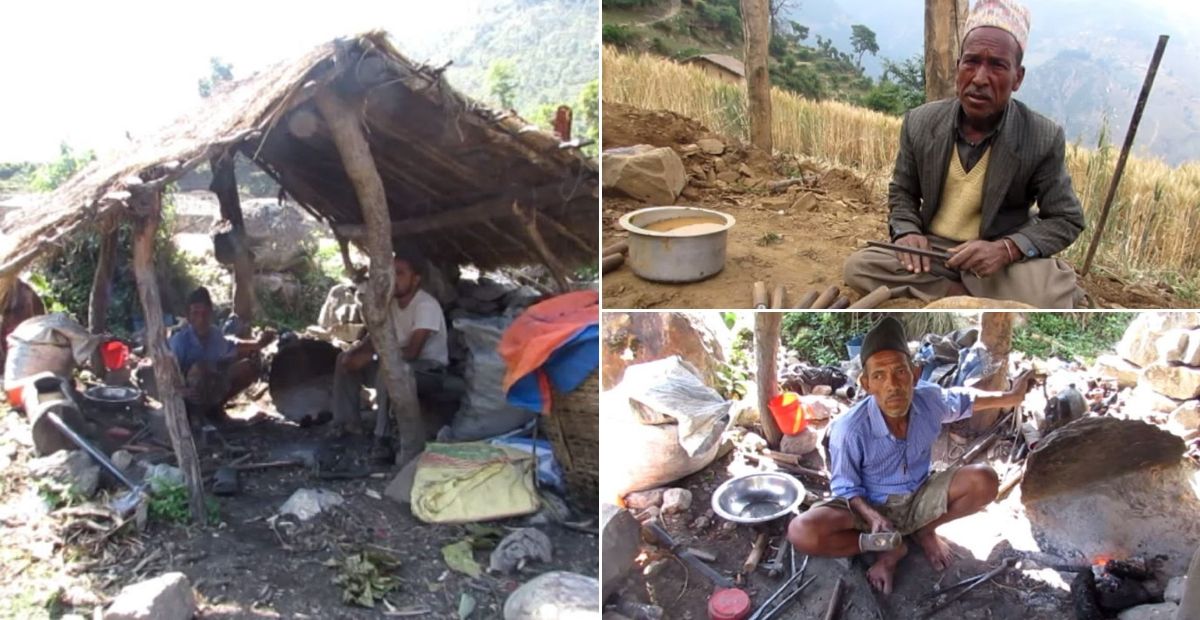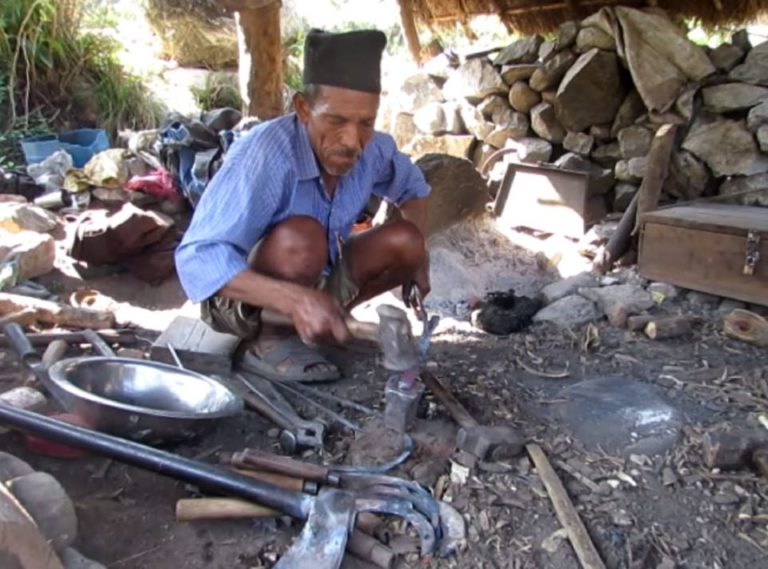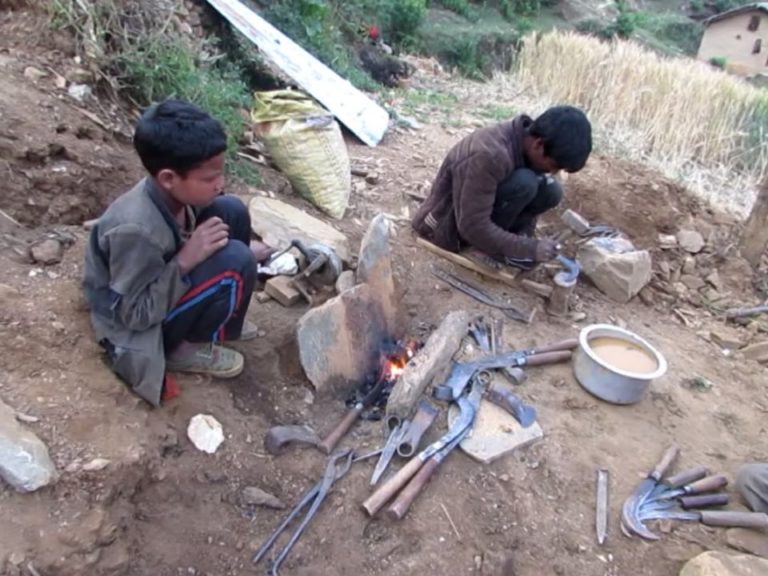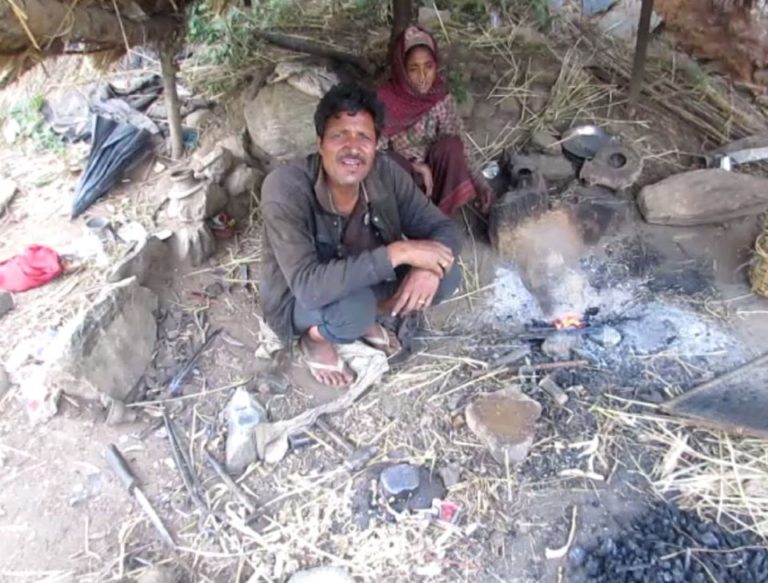0%

JAJARKOT: It is Chiuri in Nalgad municipality-2, Jajarkot district. Here lives a 62-years old Ishware Mahar, a local ironsmith. He has been working in his small furnace used for heating and molding wrought iron for the last 50 years.
He joined his ancestral occupation of an ironsmith at the tender age of 12 and has been beating iron to carve out tools and instruments of different shapes and sizes in his hut-based furnace. He is still following the footsteps of his ancestors and goes for a ramble from one house to another in his village with his thickly-made iron bowl to collect his share of grains from fellow villagers popularly called Balighare custom.
Munbahadur, a resident of Barekot village council-5, has been surviving on his ancestral occupation of a local ironsmith. He has been feeding a family of 8 members all by Balighare custom.
“Earlier, there was no problem in managing two courses of meals a day but now it is even after staying whole day near to burning heat of iron furnace”, narrates Mahar with pain and sadness.

It is not only Ishware who is going through the survival crisis in his traditional occupation as an ironsmith. Munbahadur Kami, 60, has also the same story to share. Munbahadur, a resident of Barekot village council-5, has been surviving on his ancestral occupation of a local ironsmith. He has been feeding a family of 8 members all by Balighare custom.
Like Ishware Mahar, Munbahadur too lifts up his iron bowl and take a round of his village from one house to another in order to collect grains for survival in return of his skills of an ironsmith. He has only this skill to survive on, which was passed on to him from his forefathers.
For good or bad, there is no way to escape the work of a local ironsmith, says Munbahadur Kami adding further, “Staying continually in front of iron-furnace all day long has perniciously deteriorated my body. Even then, I have not been able to properly feed myself and my family.” There are more than 200 families who survive on their traditional occupation of ironsmith in Nalgaad municipality and Borkot village council of Jajarkot district.
Unable to shift to some other occupations in want of commensurate skills and training, these local ironsmiths continue in their ancestral occupation by making agricultural tools and kitchen utensils.
Every family has furnace burning below their thatched roof to mold irons into tools (and instruments) to convenience our life even at their own inconveniences is routine affairs for them. It is now their destiny to crave for a full-course meal sumptuous enough to forget all the inconveniences they are put through. Alas! It is a dream hard to come by in reality. They know it, yet persists in their work all religiously, unfailingly and unwaveringly.
Whenever hunger overpowers them while continuously going through muscular work of lifting the hammer and striking blows one after another on a heated slab of irons, they pick up mug filled with water to drink it. Local ironsmiths mold irons to make tools generally used in agricultural field (such as sickle, spade, axe, axel, and chopper etc.), gardening (such as the hammer, hoe, and dibble) and in the kitchen (such as iron oven, bowl, glass, plates, and other utensils).

Unable to shift to some other occupations in want of commensurate skills and training, these local ironsmiths continue in their ancestral occupation by making agricultural tools and kitchen utensils. It is high time the governments at all the levels — federal, provincial and local — took the sincere efforts to organize all the cottage-scale industries traditionally passed on from our ancestors through generations.
Insuring their life and work under the protection of the government will give new lease of life to scores of local ironsmiths engaged in the traditional occupation. Kamal Nepali, a local resident, fully agrees with this proposal and says, “With a touch of modern technology and management skill, these traditional and ancestral occupations will invite hundreds and thousands of local youths to learn the art to become entrepreneurs in their own right. There is no shame in doing our own work and survive with dignity.”
Rightly so, in absence of financial and logistic assistance, many families such as these dependent upon traditional occupations are on verge of turning beggars. Just see what a back-breaking, strenuous and grinding work these local ironsmiths do for long hours every single day. It is not that easy as it looks from afar. They heat a piece of iron to make it ductile and malleable to mold in shapes and sizes as desired to suit the purpose.
A slight lapse in concentration and manual mistake not only annoy the customers but also spoil their labor of a day for which they were to be paid. Continually burning furnace invite accidents too. Flying metal sparks stick to their body or children playing around leave a scar for lifetime besides melting the flesh on the part where sparks fell down.

It is like branding a horse you own with hot metal. A person brands a horse once but they get branded many times. Further, their thatched roof get burnt due to constant exposure of heat and fire emitting from the furnace, sometimes their entire hut catches fire reducing everything into ashes except the irons and tools made out of it.
There is no way to come out of this tragedy as they are landless and cannot move to a safer place to operate on the furnace. Another grave problem they are facing is squeezing market as not many people are coming forward to buy their traditionally molded tools and instruments. They need strong backing of cooperatives, local community and organized market facility to make them earn what they really deserve.

Just last time, local ironsmiths had a tough time to manage their basic raw materials — coal to burn their furnaces. The increasing rate of deforestation has eliminated the sturdy trees whose fallen trunks and long-buried decayed parts were used by local iron-smiths to keep their furnaces burning, says Prithvi Bahadur Nepali adding further, “With the lost forests, their ancestral occupation is also on verge of getting extinct.”
These ironsmiths earn 5 Pathi (approx. 20 kg) grains after making metal wares and other tools for villagers throughout a year. How will their life survive if such a state prevails?
The productive workforce of the country is not getting attracted to such occupations due to economic insecurity and lack of organization. This is why only old people are seen working as local ironsmiths. What a joke played by destiny! Committed ironsmiths Ishware Mahar, Munbahadur Kami, Kali Bahadur Nepali, Kamal Nepali, Chauro Kami who have helped preserve the ancestral occupation are living in utter poverty.